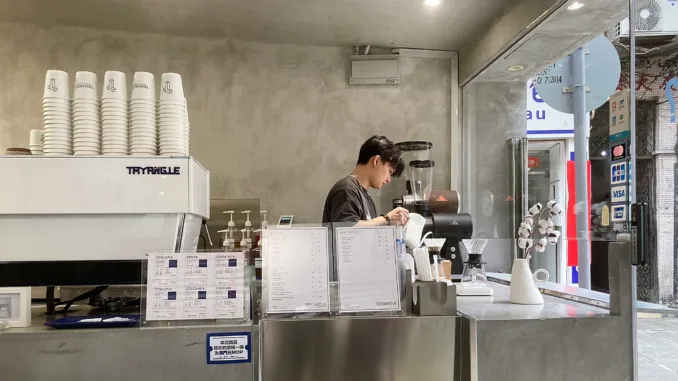
Macau, an autonomous region of China and former Portuguese colony, is a city with a long heritage, blending traditional style with a modern metropolis. It’s also home to beautiful specialty cafés and teahouses.
BY TANYA NANETTI
SENIOR ONLINE CORRESPONDENT
Photos by Tanya Nanetti
Just when you think you almost have Asia figured out, with all its facets and diverse cultures, you arrive in Macau and suddenly realize that there is so much more to discover.
A former Portuguese colony, Macau’s Old Town still carries a strong legacy of its long colonial past, which ended in 1999 after more than four centuries. From the white cobblestone streets and sidewalks typical of Lisbon to the walls covered in azulejos (colorful tiles) to the ubiquitous pastel de nata (egg tarts), Macau is probably one of the most colonial cities still standing in all of Asia. And it is unfortunate that the city is often taken for granted by tourists, who usually come here on a day trip from Hong Kong to visit the huge casinos: Macau has much to offer in terms of history and culture, as well as a vibrant food scene.
Wandering around the beautiful historic center, we had the chance to discover a handful of excellent cafés and tea shops. Here is a short list of places to visit while exploring Macau’s Old Town.
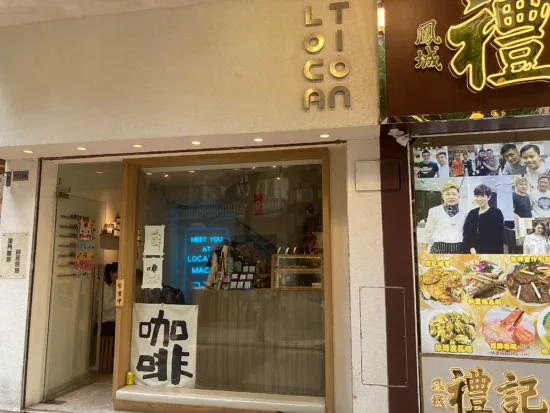
Location Coffee
Here’s the trick to getting around Macau: Hop on a free hotel shuttle that will take you close to your destination. That’s what we did once we disembarked from the ferry from Hong Kong. We discovered Location, a recently opened small café located not far from the majestic Grand Lisboa hotel, almost by accident. Trendy and cozy, and full of local guys drinking mostly signature iced drinks, Location also offers a nice selection of hand-prepared single-origin coffee.
Here we had our first chance to try China-grown beans: Slightly acidic, with a light body and a sweet aftertaste, this coffee from China made us want to explore more of this new specialty-coffee-producing region.
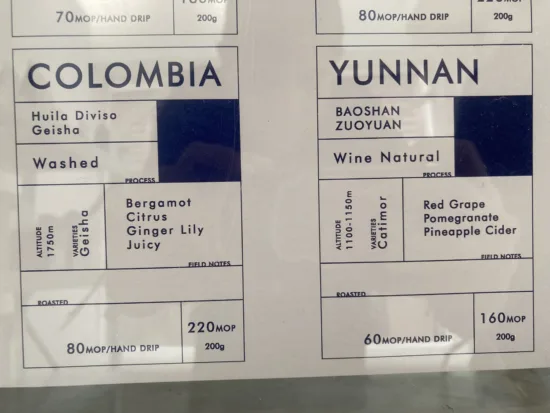
Tryangle Roastery & Coffee Co.
After we dropped our backpacks at a local pensão (the traditional cheap Portuguese hotel), we walked to the ruins of São Paulo, Macau’s most famous site, and then stopped in the pretty Rua dos Ervanários. Once a key trading area in Macau, this small alley is now home to numerous cafés, teahouses, and craft stores.
Tryangle, right at the entrance of the Rua, is a beautiful industrial space that focuses on takeout drinks without neglecting quality. In fact, it was thanks to Tryangle that we had the chance to try another delicious coffee from China, a natural Caturra from the Yunnan region that was fruity and acidic (just how we like it).
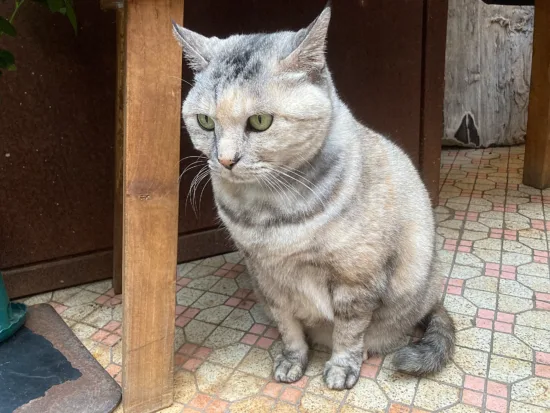
A Porta da Arte
It was thanks to a beautiful cat that we discovered one of our favorite cafés in the city, A Porta da Arte. Located a two-minute walk from Tryangle, A Porta da Arte’s name says it all: It is a “gateway to the arts,” a space where delicious coffees sit alongside tasty pastries and art objects in all their expressions. Jewelry, paintings, design objects, and handicrafts embellish the space, a former blacksmith shop that delightful owner Sequeira transformed into a café a little over seven years ago. Today, A Porta da Arte is the perfect spot in Macau to meet new friends, but also to sit on a sofa and relax while reading a good book (while the two adorable house cats keep you distracted).
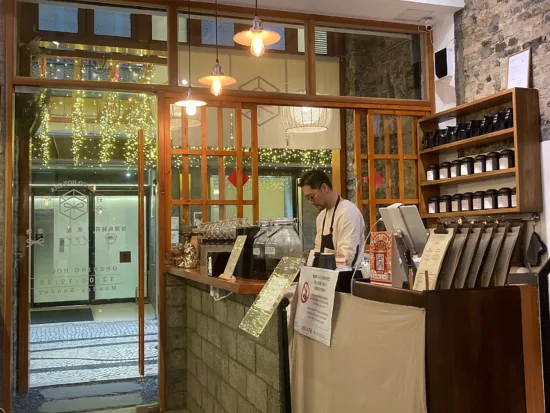
Ho Ho Hot Cha
We had just finished our full coffee immersion when we discovered, a couple of doors down from A Porta da Arte, Ho Ho Hot Cha, a wonderful teahouse that seemed full of potential. How could we not go in?
After our recent love affair with tea, we were eager to learn more, and Macau seemed the perfect place to do so.
Ho Ho Hot Cha turned out to be the ideal place to help us learn more about tea, thanks to a comprehensive menu divided by roasting style (from light to dark and smoky), a seasonal offering made up of fine micro-lots of the best teas, and an in-depth explanation of the tasting notes of all the teas available. And we cannot fail to mention the amazing service. Here each tea is brewed in a different pot depending on the quality of the tea, with instructions on how to properly drink that specific tea, and how to steep it a second and third time. In addition, complimentary cookies, also made from tea, are the perfect companion to make the experience truly unique.
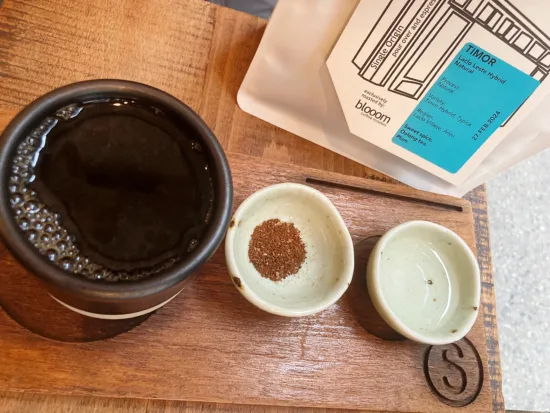
Single Origin
On the way to visit the nearby Guia Fortress and Lighthouse, atop a hill overlooking the entire Old Town, we found Single Origin, another cozy roastery that, as its name suggests, specializes in something rather unique in the Macau area: roasting and pouring only single-origin beans, both for espresso and pourover.
Here we opted for an Ethiopian coffee in espresso and a Timor Leste in filter. We were pleasantly surprised by the exceptional (and somewhat nerdy) presentation of the pourover, served alongside ground coffee and a small bowl full of hot water. Following the barista’s suggestion, after smelling the dry ground coffee, we splashed it with the water and smelled it again, noting the evolution of the aromas. It was a perfect introduction to the coffee we were about to drink.
ABOUT THE AUTHOR
Tanya Nanetti (she/her) is a specialty-coffee barista, a traveler, and a dreamer. When she’s not behind the coffee machine (or visiting some hidden corner of the world), she’s busy writing for Coffee Insurrection, a website about specialty coffee that she’s creating along with her boyfriend.
Subscribe and More!
Out now: It’s the June + July 2024 issue of Barista Magazine! Read it for free with our digital edition. And for more than three years’ worth of issues, visit our digital edition archives here.
You can order a hard copy of the magazine through our online store here, or start a subscription for one year or two.



